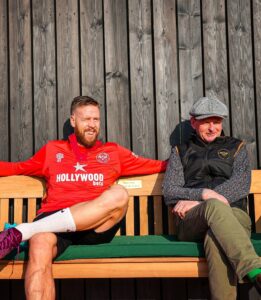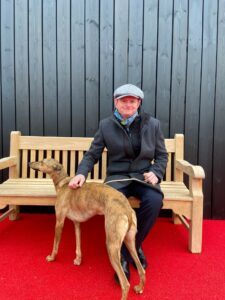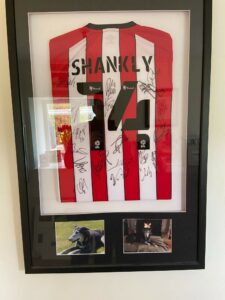Taking the science out of sports psychology
Michael Caulfield – sports psychologist at Premier League high-flyers, Brentford – talks to the Sports Gazette about a career in sports psychology that spans more than 30 years.
“We need way more and not less competitions.”
These were the words of FIFA President, Gianni Infantino after his re-election this week. Often a man whose apathy and brazenness leaves football fans with a sense of surety that our sport is in safe hands, Mr. Infantino’s latest million-dollar idea (quite literally in his eyes) will have footballers around the world perplexed at the level of self-importance that FIFA places on their profession.
The 2026 World Cup in the USA, Canada and Mexico will have 104 matches; almost double the amount of the previous World Cup in Qatar.
Players these days have a lot to deal with. Depression and anxiety amongst footballers are both on the up. Racist and homophobic abuse follow the same trend, and the rise of social media has stoked the fire.
Adding more games to the already-congested football calendar is a good way of perpetuating the problems rife in the game.
Professional sports teams employ someone to combat these issues.
At the intersection where these problems overlap and collide, is a sports psychologist who watchfully sifts through the scattered debris, and pieces the puzzle back together.
“The human aspect of performance utterly grips me, particularly in football,” Michael Caulfield, the sports psychologist at Premier League high-flyers, Brentford, told the Sports Gazette.
“It’s the jigsaw puzzle you can never quite solve. You think you’ve got it cracked, you think you’ve got it solved, and then you find out you haven’t.”
Caulfield’s off the pitch role at Brentford has been somewhat assuaged by the team’s performance on the pitch. The Bees currently sit eighth in the league, and are eyeing up a finish in the European places having only lost one game since the end of October.
“Having been through so many things in my sporting career, I know how good this is at the moment,” he said.
His career is fraught with experiences at parallel ends of the sporting spectrum. From 1988 to 2003, Caulfield was the Chief Executive of the Professional Jockey’s Association.
A conversation with record-breaking former jockey, Sir Anthony McCoy OBE – or AP McCoy as he is commonly referred to – however, diverted his career path, and steered him into the realm of sports psychology.
“’I’d pay to see you if you were a sports psychologist because you’re the one person who understands my madness’ he said. That’s one conversation that took my life in a completely different direction,” Caulfield said.
Caulfield has worked with Cricket Ireland, world-renowned journalists and broadcasters, and many elite-level football clubs.
With such variation, adaptability is paramount.
“I use the analogy of religion. If I went to a Catholic Church, I’d behave in a certain way. If I went to a Mosque, I’d behave in a certain way. It’s the same in sport. I always respect the church I worship in,” Caulfield said.
His current church is at Brentford: consecrated by the fans whose devotion is inspired by the team amongst the many other factors that give football its religious nuances.
But what is the role of a sports psychologist at a Premier League football club?
You might think that a sports psychologist’s role is to explicate the intricacies of Maslow’s Hierarchy of Needs. You might think it’s about drawing out emotions from the unconscious mind.
You may picture someone in a white lab coat relaying Freud’s psychosexual stages of development to a cohort of very confused footballers. That last thought would be quite weird, but based on Gareth Ainsworth’s latest team-building exercise, stranger things have happened.
https://twitter.com/QPR/status/1631353688773083137
Caulfield’s approach, however, is simpler, less technical. His fascination is with people, their interactions with each other, and everything in between.
“If you only want science, data and measures, look elsewhere. If you want someone who can make sense of all the clutter that exists in the minds of all athletes and coaches and help them focus on performance, then give Mike a ring.”
That’s what the current England manager, Gareth Southgate, said about Caulfield, and it explains his occupational capacity at Brentford astutely.
“I am terribly interested in people rather than things. I’m always fascinated and intrigued in the person behind the idea.
“Am I going to start suddenly teaching Ben Mee new tricks at 32? I doubt it.
“My job is still very much to deal with people, their emotions and the challenges they face.
“As the world gets faster, busier and noisier, often the simplest things are the best remedies,” Caulfield said.

Football is already a fast-paced and busy environment to work in, and thanks to Mr. Infantino and co. its upward trajectory will embark on a steeper gradient in 2026.
Fortunately for Brentford fans though, while the games have been coming thick and fast, the points have too.
Yet it must be different for a club like Southampton, or Wigan Athletic, or Forest Green Rovers. These are the teams at the opposite end of their respective tables, where troubles are frequent and formidable.
The Bees have also had their fair share of hardship during Caulfield’s incumbency at the club. Unbeknownst to many, the start of Thomas Frank’s tenure in West London was far from ideal, with Brentford losing eight of their first ten games under the Dane.
“Losing heavily and often does bring pressure, and that’s when sometimes you’re most needed because you have to manage that tension and emotion,” said Caulfield.
“Try and make sure you put the bonfires out before they become infernos.”
Again, Caulfield’s way of dealing with potential infernos is candid but concurrently effective.
Cognitive Behavioural Therapy or CBT, is a psychological talking therapy with proven efficacy. Caulfield’s hybrid version of the therapy included his dog at the time, Shankly, to form Cognitive Behavioural Dog Therapy, or CBDT, if you will.

The then-manager of Brentford, Dean Smith, encouraged Caulfield to bring his Lurcher down to the training ground at Jersey Road.
“It’s an example of not overthinking or overplanning everything.
“By the end of it, we were often walking around the pitches together, myself and Dean, or another member of staff, or even the playing staff.
“It was Henrik Dalsgaard before the play-off final against Swansea who mentioned my role by saying – and I’ve got the quote down to a tee: ‘He comes in with his dog and we just give him the heavy stuff from our hearts’.”
Shankly unfortunately passed away at 14 years-old during the second COVID lockdown. A signed shirt was presented to Caulfield at the training ground. Paisley – Caulfield’s current dog – has since taken up CBDT duties at Jersey Road.

The emphasis Caulfield places on trusted conversation is, for him, as important, if not more, than his formal training as a sports psychologist – especially when it comes to the pressures of being a modern-day footballer.
As Caulfield and Southgate both attest to, the data science approach is not Brentford’s preferred model of sports psychology. Instead, they focus on the human aspect: talking, walking and sharing.
“If you’ve got a very trusting, open culture, I think you can deal with most things. If there’s terrible racist abuse floating around, I’d like to think we know how to support people. To make sure that they’re okay and their families are okay.
“So much in life is about trust. So much in life is about timing. You have to build trust and get the timing right for your conversations and interventions. Also, that timing sometimes means shutting up and leaving people to it,” he said.
The famous data-driven approach at Brentford is used to analyse player performance and recruit hidden gems. The two antithetical styles work in perfect harmony with one another, and have so far, been part of a winning strategy for Brentford.
“What’s happening at Brentford is down to people that have been at Brentford for a very long time, and the players themselves.
“I feel remarkably privileged to be part of this extraordinary few years in Brentford’s history,” he said.